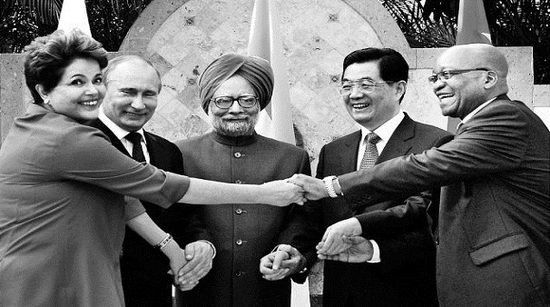Last week I participated in a seminar on “BRICS Trade, Investment and Finance Cooperation” in New Delhi, organized by the Observer Research Foundation (ORF). ORF, one of India’s leading foreign policy think tanks, is the official coordinator of the track II academic forum which took place prior to the 4th BRICS Summit in March 2012. The track II meeting resulted in an ambitious list of 17 policy recommendations which includes, most notably, a recommendation to “study the establishment and operational modalities of financial institutions such as a Development Bank and/or an Investment Fund that can assist in the development of BRICS and other developing countries.” The question of how exactly such a ‘BRICS Bank’ should look like was one of the key issue debated at the ORF seminar.
While all BRICS governments support the idea of a common development bank in principle, most details have yet to be hammered out – ranging from where and how the Bank would raise capital, where and on what it would invest its funds, and – perhaps most politically charged – who should lead it and where its headquarters would be. Usha Titus from the Indian Ministry of Finance signaled that these issues were currently discussed among the BRICS members’ governments, yet during the debate she encouraged the academic and think tank community to foster the debate and generate ideas on the issue.
The idea of a BRICS Development Bank, which I have written about in previous posts (“Debate about BRICS Bank advances”, “Is it time for a BRICS Development Bank?”), emerged in India. In addition, Indian thinkers have clearly assumed thought leadership on the issue: In a detailed op-ed in The Hindu, for example, Samir Saran and Vivan Sharan make the case for the establishment of the BRICS Bank. In South Africa, the debate is picking up as both foreign policy makers and analysts are preparing for the 5th BRICS Summit in Pretoria in 2013. In Brazil, China and Russia, on the other hand, the issue is limited to small a group of specialists.
Yet a broader public debate in all member countries about the design of such a bank is desirable considering the important economic and strategic consequences the creation of such an institution would have. Tied to the questions about the BRICS Bank come other, equally important issues, such as the potential creation of an alternative global payment regime, a pricing framework and commodities exchange denominated in a currency other than the dollar, a global insurance agency and an alternative to the SWIFT network. Debating these issues requires imagination and the willingness to develop new ideas, something academics are often uncomfortable with. It may be no coincidence that India, with its multitude of think tanks, acts as an agenda setter on several of these issues.
Several other areas of cooperation were debated at the seminar – G. K. Pillai, a former Union Commerce and Home Secretary, argued that the BRICS should set up alternative rating agencies. Zothan Khuma of India’s Ministry of Commerce told the audience about the BRICS Contact Group on Trade and Economic Issues, which was established in 2011 and recently met in New Delhi. His presentation led to a series of spontenous suggestions from participants about what the group should pursue – ranging from promoting trade facilitation, fostering ties between SMEs, and creating a ‘BRICS Visa’, akin to the visa-free travel agreement between Russia and Brazil, which came into effect in 2010.
Several of the ideas debated in New Delhi last week may never be implemented – yet fostering an open exchange of ideas between policy makers, academics, the think tank and business community are a crucial element of taking the conversation about the BRICS’ short-, medium- and long-term vision forward and develop concrete proposals for the 5th BRICS Summt in Pretoria in 2013.
Read also:
Emerging powers remain divided on R2P and RwP
Despite economic slowdown, BRICS grouping is here to stay
BRICS: What’s in it for Brazil?
PHOTO: PTI/ Vijay Verma









